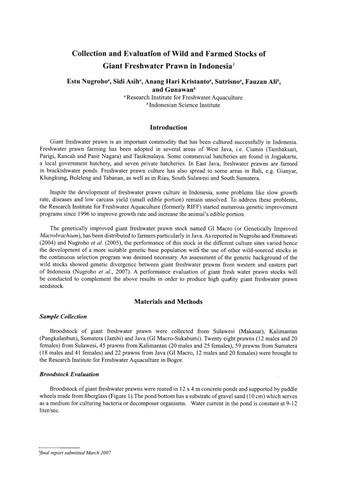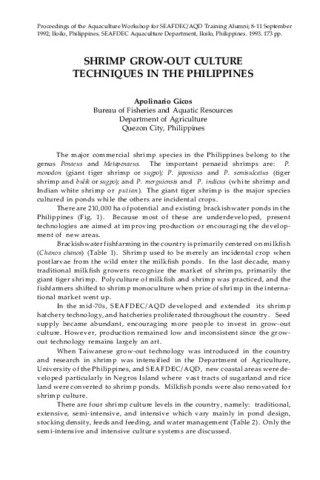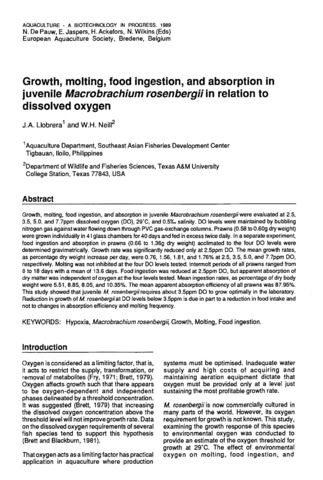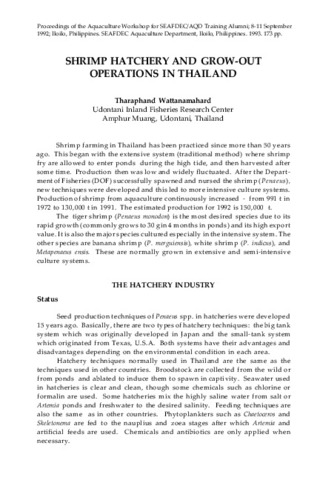Collection and evaluation of wild and farmed stocks of giant freshwater prawn in Indonesia
- Global styles
- MLA
- Vancouver
- Elsevier - Harvard
- APA
- Help
Share
抄録
Giant freshwater prawn is an important commodity that has been cultured successfully in Indonesia. Freshwater prawn farming has been adopted in several areas of West Java, i.e. Ciamis (Tambaksari, Parigi, Rancah and Pasir Nagara) and Tasikmalaya. Some commercial hatcheries are found in Jogjakarta, a local government hatchery, and seven private hatcheries. In East Java, freshwater prawns are farmed in brackishwater ponds. Freshwater prawn culture has also spread to some areas in Bali, e.g. Gianyar, Klungkung, Buleleng and Tabanan, as well as in Riau, South Sulawesi and South Sumatera.
Inspite the development of freshwater prawn culture in Indonesia, some problems like slow growth rate, diseases and low carcass yield (small edible portion) remain unsolved. To address these problems, the Research Institute for Freshwater Aquaculture (formerly RIFF) started numerous genetic improvement programs since 1996 to improve growth rate and increase the animal’s edible portion.
The genetically improved giant freshwater prawn stock named GI Macro (or Genetically Improved Macrobrachium), has been distributed to farmers particularly in Java. As reported in Nugroho and Emmawati (2004) and Nugroho et al. (2005), the performance of this stock in the different culture sites varied hence the development of a more suitable genetic base population with the use of other wild-sourced stocks in the continuous selection program was deemed necessary. An assessment of the genetic background of the wild stocks showed genetic divergence between giant freshwater prawns from western and eastern part of Indonesia (Nugroho et al., 2007). A performance evaluation of giant fresh water prawn stocks will be conducted to complement the above results in order to produce high quality giant freshwater prawn seedstock.
Suggested Citation
Nugroho, E., Asih, S., Kristanto, A. H., Sutrisno, Ali, F., & Gunawan. (2007). Collection and evaluation of wild and farmed stocks of giant freshwater prawn in Indonesia. In M. R. R. Eguia & M. L. C. Aralar (Comps.), Recent developments in the genetic improvement of the giant freshwater prawn (Macrobrachium sp.) (pp. 13–18). Tigbauan, Iloilo, Philippines: Aquaculture Department, Southeast Asian Fisheries Development Center.
Type
Book chapterISBN
9789718511848
Related items
Showing items related by title, author, creator and subject.
-
Shrimp grow-out culture techniques in the Philippines
Gicos, Apolinario (Aquaculture Department, Southeast Asian Fisheries Development Center, 1993)The major commercial shrimp species in the Philippines belong to the genus Penaeus and Metapenaeus. The important penaeid shrimps are: P. monodon (giant tiger shrimp or sugpo); P. japonicus and P. semisulcatus (tiger shrimp ... -
Growth, molting, food ingestion, and absorption in juvenile Macrobrachium rosebergii in relation to dissolved oxygen
Llobrera, Jose A.; Neill, William H. (European Aquaculture Society, 1989)Growth, molting, food ingestion, and absorption in juvenile Macrobrachium rosenbergii were evaluated at 2.5, 3.5, 5.0, and 7.7ppm dissolved oxygen (DO), 29°C, and 0.5°/oo salinity. DO levels were maintained by bubbling ... -
Shrimp hatchery and grow-out operations in Thailand
Wattanamahard, Tharaphand (Aquaculture Department, Southeast Asian Fisheries Development Center, 1993)Shrimp farming in Thailand has been practiced since more than 50 years ago. This began with the extensive system (traditional method) where shrimp fry are allowed to enter ponds during the high tide, and then harvested ...






